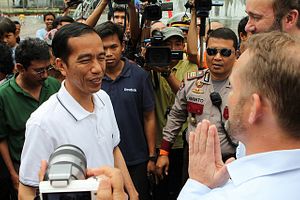Indonesia’s presidential election has come to a close, for now at least, as Joko Widodo – popularly known as Jokowi – was announced the winner by the electoral commission on Tuesday night by a margin of 53 percent, two weeks after the elections were held on July 9. While Joko has already made his acceptance speech and a general call for unity now that the election is over, his rival Prabowo Subianto has withdrawn from the election process claiming that there has been “massive” voter fraud. While Prabowo’s decision whether or not create a drawn out and potentially violent protest of the elections will determine Indonesia’s short-term stability, both markets and regional neighbors have reacted positively to Joko’s election. It is also worth noting that despite Prabowo’s connections and ties to the military, he has said that he would not resort to violence in order to address his concerns.
Ahead of the final results announcement by the electoral commission, Prabowo condemned the vote counting process and ordered his observers to leave the building where the electoral commission was completing its final tallies on Tuesday night. After ordering his supporters to leave, the head of his legal team told reporters, “We have decided to bring this case to the Constitutional Court (within three days),” according to The Guardian. Three days is the amount of time either candidate has to bring a challenge before the Constitutional Court. While there were several thousand riot police on hand around the building where the votes were being counted, no major disturbances were reported as both candidate’s supporters listened to calls for them to stay home.
Joko’s election represents a significant departure for Indonesia. Rising from humble beginnings to become the governor of Jakarta, he will be the country’s first president to be selected from outside the ruling military and political elite. While Prabowo has cited “massive, structural and systematic cheating during the 2014 election,” and said, “we will exercise our constitutional right to reject the presidential election and declare it unconstitutional,” he has so far made no obvious move to use his significant influence to push the election results in his favor. After Prabowo’s announcement, Joko reportedly replied “I am sure Prabowo is a statesman who will put the national interest above everything else,” and current President Susilo Bambang Yudhoyono has urged all concerned to respect the final vote count.
While the election results have not been without controversy or the possible threat of protracted and even violent dispute, key regional players and the markets have reacted favorably to the announcement of Joko’s presidency. According to the Financial Times, the Indonesian rupiah reached a two-month high against the U.S. dollar, trading at 11,488 per dollar at midmorning on Wednesday. The Jakarta composite index also rose 20 percent this year in expectation of Joko’s election. On the back of Joko’s statements during presidential debates that Indonesia should build links with Australia to restore trust and respect, Australian Prime Minister Tony Abbott took time to congratulate him, saying “The Australian government is looking forward to working closely with him… [and] the relationship with Indonesia is extraordinarily important to us.”
Joko will need all the international and domestic support he can muster if he is to overcome Indonesia’s significant economic and political problems. As my colleague Luke Hunt noted last week, Joko’s PDI-P will not have a majority in the parliament, and while Joko was able to govern in Jakarta without a majority, Yudhoyono could not manage to effectively wield the national parliament with 70 percent support. To compound the problem, Prabowo’s coalition will hold roughly two-thirds of parliamentary seats. Joko will also struggle to govern a country where falling commodity prices have significantly hurt Indonesia’s economy. He has also vowed to reform the county’s $20 billion annual fuel subsidy, which former administrations attempted and resulted in street protests nationwide.
Indonesia’s ability to peacefully elect a president outside of the military and political establishment bodes well for both regional political stability and Indonesia’s role in regional bodies like ASEAN. With perennial coups in Thailand and disputed elections in Cambodia and Malaysia, the successful transition to a populist candidate free of ties to Indonesia’s militant past should certainly help attract positive attention and investment. However, Joko’s inexperience at the national level will test this goodwill early on, as Indonesia faces problems with its infrastructure and a transition to a more value-added economy, tough challenges for even the most seasoned of political veterans.

































